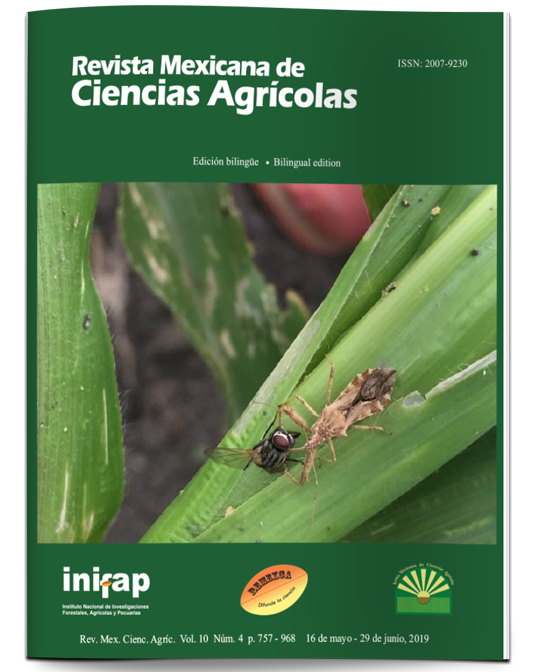Viability and longevity of pollen in Mexican lemon genotypes estimated by in vitro germination
DOI:
https://doi.org/10.29312/remexca.v10i4.1780Keywords:
Citrus aurantifolia, pollen germination, pollen longevity, pollen viabilityAbstract
Studies of pollen viability and longevity in the genotypes selected as progenitors are useful to ensure the success of hybridizations in a breeding program. The present study was carried out in the Tecoman Experimental Field of INIFAP, in Tecoman Colima, Mexico, during the months of January and February of 2008 and 2009. The viability and longevity of the pollen were estimated in three varieties of Mexican lemon [Citrus aurantifolia): ‘Colimex’, ‘Colimon’ and ‘Lise’, two natural hybrids of Mexican lemon; CV 63-64 and CV 67-68 as well as the ‘Citrange C-35’ (C. sinensis x Poncirus trifoliata) as a control. The formulations of Brewbaker and Kwack (1963); Lora et al. (2006); Leal (1969) modified were evaluated. The three culture media promoted in vitro germination of pollen grains in very similar proportions, close to 20%. The genotypes, ‘Colimon’ and ‘Lise’ registered low germination percentages of 0.78% and 3.05% respectively. On the other hand, the variety ‘Colimex’ and the natural hybrid CV 63-64, had intermediate percentage values, while the ‘Citrange C-35’ and the natural hybrid CV 67-68 reached the highest pollen viability percentages (43.3% and 39.69% respectively) and can function as pollen donors. The pollen of all genotypes evaluated, conserved at room temperature, which fluctuated between 21 °C and 30 °C, lost almost 100% of its viability 48 h after anthesis. This is the first study on the viability and longevity of Mexican lemon pollen using in vitro germination tests.
Downloads
Downloads
Published
How to Cite
Issue
Section
License
The authors who publish in Revista Mexicana de Ciencias Agrícolas accept the following conditions:
In accordance with copyright laws, Revista Mexicana de Ciencias Agrícolas recognizes and respects the authors’ moral right and ownership of property rights which will be transferred to the journal for dissemination in open access. Invariably, all the authors have to sign a letter of transfer of property rights and of originality of the article to Instituto Nacional de Investigaciones Forestales, Agrícolas y Pecuarias (INIFAP) [National Institute of Forestry, Agricultural and Livestock Research]. The author(s) must pay a fee for the reception of articles before proceeding to editorial review.
All the texts published by Revista Mexicana de Ciencias Agrícolas —with no exception— are distributed under a Creative Commons License Attribution-NonCommercial 4.0 International (CC BY-NC 4.0), which allows third parties to use the publication as long as the work’s authorship and its first publication in this journal are mentioned.
The author(s) can enter into independent and additional contractual agreements for the nonexclusive distribution of the version of the article published in Revista Mexicana de Ciencias Agrícolas (for example include it into an institutional repository or publish it in a book) as long as it is clearly and explicitly indicated that the work was published for the first time in Revista Mexicana de Ciencias Agrícolas.
For all the above, the authors shall send the Letter-transfer of Property Rights for the first publication duly filled in and signed by the author(s). This form must be sent as a PDF file to: revista_atm@yahoo.com.mx; cienciasagricola@inifap.gob.mx; remexca2017@gmail.
This work is licensed under a Creative Commons Attribution-Noncommercial 4.0 International license.



